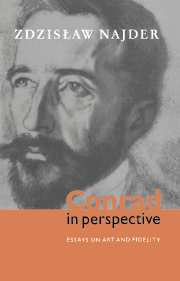Book contents
- Frontmatter
- Contents
- Acknowledgements
- Note on the texts
- List of abbreviations
- 1 Introduction, or confession of a mastodon
- 2 Conrad's Polish background, or from biography to a study of culture
- 3 Joseph Conrad's parents
- 4 Joseph Conrad and Tadeusz Bobrowski
- 5 The Sisters: a grandiose failure
- 6 Lord Jim: a Romantic tragedy of honour
- 7 The Mirror of the Sea
- 8 A Personal Record
- 9 Joseph Conrad's The Secret Agent, or the melodrama of reality
- 10 Conrad, Russia and Dostoevsky
- 11 Conrad and Rousseau: concepts of man and society
- 12 Conrad and the idea of honour
- 13 Joseph Conrad: a European writer
- 14 Joseph Conrad after a century
- 15 Joseph Conrad in his historical perspective
- 16 Fidelity and art: Joseph Conrad's cultural heritage and literary programme
- Notes
- Index
14 - Joseph Conrad after a century
Published online by Cambridge University Press: 07 December 2009
- Frontmatter
- Contents
- Acknowledgements
- Note on the texts
- List of abbreviations
- 1 Introduction, or confession of a mastodon
- 2 Conrad's Polish background, or from biography to a study of culture
- 3 Joseph Conrad's parents
- 4 Joseph Conrad and Tadeusz Bobrowski
- 5 The Sisters: a grandiose failure
- 6 Lord Jim: a Romantic tragedy of honour
- 7 The Mirror of the Sea
- 8 A Personal Record
- 9 Joseph Conrad's The Secret Agent, or the melodrama of reality
- 10 Conrad, Russia and Dostoevsky
- 11 Conrad and Rousseau: concepts of man and society
- 12 Conrad and the idea of honour
- 13 Joseph Conrad: a European writer
- 14 Joseph Conrad after a century
- 15 Joseph Conrad in his historical perspective
- 16 Fidelity and art: Joseph Conrad's cultural heritage and literary programme
- Notes
- Index
Summary
On 28 February 1889 Konrad Korzeniowski (not yet ‘Joseph Conrad’, but a British subject with a name which kept presenting difficulties, rarely surmountable, to many scribes in various maritime offices), Ordinary Master of the British Merchant Marine, was master of a small – 346 tons – iron barque, Otago, moored at Port Minlacowie in Spencer Bay, Southern Australia. A few weeks before, he had returned from a long voyage to the island of Mauritius, where he had flirted – in French, his second language – with a local girl whom he proposed to marry. In another month or so, upon arrival at Port Adelaide, he would resign his first (and, as it turned out, only) command and return to Europe.
At that time he was not yet writing anything apart from long letters in Polish to his uncle and former guardian, a landowner in the Ukraine. He would start writing fiction about six months later, during a prolonged stay in London in the autumn of 1889. He left the sea permanently in 1894 and made his literary début a year later.
These few biographical facts show immediately that he was a highly unusual person. Immediately, but far from fully. Outstanding artists tend to have untypical lives; but Conrad-Korzeniowski was untypical to the extreme. Brought up in Polish culture, with his father a poet and a politically active patriot, as a teenager he left his home country for France. French literature and French intellectual tradition were the second element which shaped his mentality and artistic attitude. And then he became a professional seaman, serving mainly in sailing-ships – which meant physical effort and hardships on a scale now difficult to imagine.
- Type
- Chapter
- Information
- Conrad in PerspectiveEssays on Art and Fidelity, pp. 176 - 187Publisher: Cambridge University PressPrint publication year: 1997



